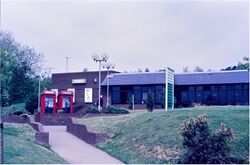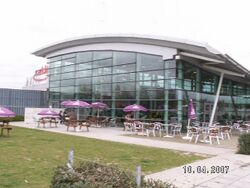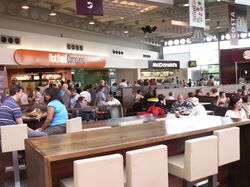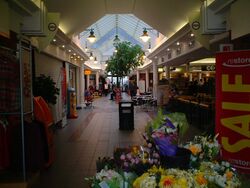History of Roadchef
Roadchef was formed in 1971 as a joint venture between Lindley Catering Investments and Galleon World Travel. It was known as "Galleon RoadChef" for quite a while and often abbreviated to just "Galleon".
See also: Roadchef Logo History
Early Moves
The first Roadchef service area opened at Killington Lake in 1972, after agreeing a partnership with the owners, BP. They then began developing a chain of restaurants along A-roads, starting with a nearby branch at Ings. Some had Roadchef-operated fuel, while others didn't. Their negotiations with fuel suppliers allowed them to expand fast.
Meanwhile, the new company was entering successful bids to run motorway sites at Taunton Deane (1971), Sandbach (1972), Bothwell/Hamilton (1972) and Rownhams (1973). Rownhams was their biggest offer and the first they heard back from. Many of these successes turned out to be poisoned chalices: Rownhams was much quieter than they were promised, Taunton Deane's contractor collapsed leaving them with a half-built building, and Bothwell/Hamilton were known to have very tight margins.
Their buildings were generally very small, and had one large restaurant, instead of the two or three which other operators had been using. To stand out from their rivals, in 1976 Roadchef increased the price of their fuel but offered 50p off food or 20p off mail with each sale.
An additional motorway site was negotiated at Sedgemoor. The three A-road sites were sold to Little Chef towards the end of the decade, leaving Roadchef with a chain of seven motorway sites.
Roadway
In 1974, the company opened a chain of four transport cafés, called Roadway. These were on single carriageway A-roads, with some straddling both sides of the road and also selling fuel. Some were earmarked to eventually be upgraded to full Roadchef restaurants.
All four had been sold by 1978, as the company focused on motorways, and extremely little has been written about them.
Prior Report and Aspirations
In the Prior Report of 1978, Roadchef complained they were rookie operators leaving them heavily in debt compared to their established rivals.
Weirdly, Roadchef's complaint was that there were too many service areas, despite their plans to build more. They were particularly concerned about new hypermarkets opening; they wanted their services to double up as shopping centres and entertainment venues, citing WHSmith as an example of someone they wanted to run their shops.
In particular, limits on fuel prices would have ended Roadchef's 'food for fuel' voucher system, which was attracting them considerable custom, and as a small business they wouldn't benefit much from the planned new arrangements.
The Department of Transport accused them of ending up in this position through poor business practice, and considered allowing them to fall on their own sword. However, they didn't want the industry to be seen to be struggling, so they agreed to negotiate special arrangements to allow them to remain competitive. This would later be abandoned.
1980s and 1990s

After a management buyout in 1983, new managing director Patrick Gee wanted Roadchef to be a company owned by his employees. Staff would acquire shares gradually, depending on their length of the service. Patrick Gee died before this vision could be fulfilled, and only 20% of the company's shares had been awarded. The company's motto was "we're here to serve you".
Under new CEO Timothy Ingram Hill, Roadchef started to grow rapidly again, and became engaged in several takeovers including Harthill. They rebuilt this and some of their older service areas, creating a similar style used across the board, with exposed brick interiors and brown tinted windows.
Roadchef's waitress service restaurant was called Hickory's and started opening branches on A-roads as promoted as a chain in its own right, like Little Chef and Happy Eater. Some branches, like Nene Valley, barely mentioned the Roadchef name at all. These would eventually be leased to others or closed, allowing Roadchef to focus on the busier motorways.
Following the creation of the Route 25 burger bar at Clacket Lane, Roadchef experimented with Wimpy and McDonald's. Wimpy won and was rolled out, although planned drive thrus didn't go ahead.
On 30 July 1998 they acquired three service areas from Blue Boar (including the oldest in the country, Watford Gap) and Take-a-Break's only, Strensham, in a move which cost £80million overall (around £152million in 2025). Although this didn't push them too far forward on the league table, it did take a big name from the industry.
Their restaurant at the time was called Orchards, and was praised for its attractive décor, with its trellises and plants. Their service areas were also commended for their soft lighting and quiet atmosphere. Many of them had mock-heritage street lights inside the building, along with plants and an atrium roof, to create a 'village street' feeling. From the outside, some new branches looked more like a farmhouse.
Hotels Division
As Roadchef started to roll out the RoadChef Lodge to its services, it started taking an interest in following Forte and Granada into providing budget hotels away from the motorway.
Roadchef received planning permission for hotels by the NEC and at Wembley. Their service station hotels were later branded Travel Inn.
Takeover and REBTL Consequences
In 1998, managing director Timothy Ingram Hill sold Roadchef to Nikko Europe, claiming he couldn't offer the financial backing his rivals had. Ingram Hill kept the planned hotels, and opened them under the name Ingram Hotel.
Timothy Ingram Hill was praised for his contribution to growing Roadchef, and for negotiating an extremely good sale price. That sale price should have benefited staff, who all owned shares in the company via the Roadchef Employee Benefit Trust (REBTL). However the bonus they received was much lower than expected.
Company secretary Tim Warwick had become suspicious about the management of the REBTL scheme in 1995. In January 1999 he formally reported that the shares had been acquired by the former CEO, resulting in his dismissal. Whistleblowers weren't protected at the time.
The case was finally set to be resolved in March 2015, when the High Court ruled in favour of the staff and awarded them payments of around £10,000 each. However, it was soon discovered that HMRC had kept a substantial tax payment that wouldn't have been accrued if the staff had been in possession of their shares. This matter was raised with Prime Minister Boris Johnson in January 2020. A number of MPs have suggested HMRC pay the staff. Tim Warwick, the original whistleblower, sadly died in August 2020, without knowing the final outcome of his case.
The modern Roadchef has distanced itself from "the actions of Mr. Ingram Hill", and said that they "support the trustees efforts" to resolve the matter. REBTL said current Roadchef management had "assisted" with the case. Timothy Ingram Hill's statement wished the employees "the very best"; there had been no suggestion that he had acted illegally.
2000s

Starting in 1999, Roadchef negotiated a contract with Costa, a brand which would go on to be found at service stations and petrol stations right across the country. At the time Roadchef said there was increasing demand for good coffee, and that the Costa brand worked well with their own.
Roadchef set about rebuilding several more of their oldest services, now using a largely-glass structure. This was followed by the construction of the state-of-the-art Norton Canes, which used one large, airy building with fountains outside.
In 2008 Roadchef had a series of financial difficulties and sold Winchester services. They also shook off unprofitable Harthill.
Like other operators, they introduced several new brands to their services such as WHSmith and another attempt at McDonald's, the former replacing reStore. They also replaced Wimpy with their own branded The Burger Company and they experimented with Pasty Presto and Soho Coffee Co.
Travel Inn was taken over by Premier Inn and later replaced by Days Inn.
Other Interests
In 2003 Roadchef started sponsoring several haulage firms in order to generate publicity. They also said that they were in talks with Tesco Metro about opening stores at their service areas, and began to invest in their company-owned forecourts, introducing the likes of SPAR, Costa, Delice de France and Rollover. They adopted J.J Beano's-branded coffee machines.
Roadchef were trialling the idea of a 'RoadCard', a loyalty card for Roadchef users that could be used at Stafford and Strensham which was able to physically display the number of points held. This was eventually pulled due to lack of interest and technology moving forwards.
Roadchef offered a free BT WiFi service for all customers, something which proved popular and was later followed up on by other operators.
Roadchef celebrated the 50th anniversary of their Watford Gap services in 2009.
2010s

In October 2010, they confirmed plans regenerate the company's entire estate until 2015. The first two years saw £12million (around £18million in 2025) spent on redeveloping the catering facilities at ten key sites. At the same time, Roadchef also signed a 20 year agreement with McDonald's following the successful trial at Strensham.
They also said confirmed all their Restbite outlets were going to be changed to Hot Food Co., following the successful trials at Strensham, Northampton and Watford Gap. This didn't happen as they used Fresh Food Café instead, which was cautiously rolled out to most sites.
Finally, Roadchef also confirmed that all of their Costa outlets were going to be moved to larger units or be upgraded. In February 2013, Roadchef confirmed that they will be upgrading all of their Restbite restaurants but at the moment, with Fresh Food Cafe generally being the favoured replacement. The refurbished sites do without dark units, and instead offer one large food court.
In August 2011, Roadchef bought First's two services, in a deal reportedly worth £10million (around £15million in 2025). They refurbished Magor but, after saying they would "play around with it", they sold Symonds Yat.
After some years of reports that they would be sold by their then parent company Delek, they were acquired by Antin Infrastructure Partners (Antin IP) on 30 September 2014. By now many of Roadchef's petrol stations had been sold to other operators, allowing Roadchef to focus on hospitality rather than fuel.
In 2014 Roadchef acquired a new facility at Sutton Scotney, and began a programme of refurbishment.

